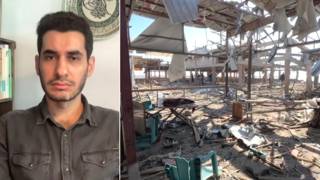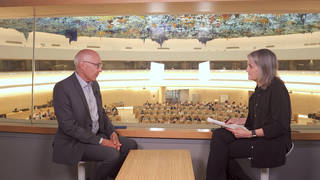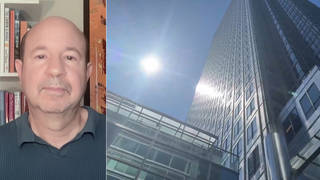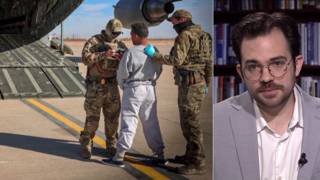
Topics
Guests
- Allan NairnA veteran investigative journalist. He was in Haiti during the 1991-94 coup and broke a number of stories that proved the direct links between US intelligence agencies and Haitian paramilitary death squads. Among the stories he broke was that the head of FRAPH, Emmanuel “Toto” Constant, was on the payroll of the Defense Intelligence Agency.
We speak with Terry Waite, who was held captive for almost five years by Islamic militants in Lebanon from 1987 to 1991, about the conditions and legal rights of the more than 650 prisoners held in Guantanamo Bay. [includes transcript]
On Monday, European families of Guantanamo detainees traveled to Washington to denounce the treatment of their relatives and to urge President Bush to respect their legal rights.
The UK-based Guantanamo Human Rights Commission, made up of family members and supporters of the detainees, had hoped to meet with President Bush, but instead had to settle for a march to the White House. Among the family members was British citizen Terry Waite as well as actors Corin and Vanessa Redgrave.
The Guantanamo Human Rights Commission is holding a discussion tonight in Cooper Union Great Hall in New York City.
- Terry Waite, former British hostage who was held captive for almost five years by Islamic militants in Lebannon. In 1987 as a special envoy to the Archbishop of Canterbury he headed to Lebanon in 1987 to win freedom for several hostages. But he was kidnapped by militants and spent four years in solitary confinement until his release in 1991.
Transcript
AMY GOODMAN: We start our discussion right now with Azmat Begg. His son, Moazzam is one of four British men who remain in custody at Guantanamo. Welcome to Democracy Now! And we are also joined by Rachel Meeropol, an attorney for the Center for Constitutional Rights. She is the granddaughter of Julius and Ethel Rosenberg, executed June 19, 1953 in this country. Welcome to Democracy Now!
RACHEL MEEROPOL: Thank you.
AMY GOODMAN: And on the telephone with us from Britain is Terry Waite, former British hostage who was held captive for almost five years by Islamic militants in Lebanon. In 1987 as a special envoy to the archbishop of Canterbury, he headed to Lebanon to win freedom for several hostages. He was kidnapped there and spent four years in solitary confinement until his release in 1991. We welcome you as well, Terry Waite, to Democracy Now!
TERRY WAITE: Thank you very much.
AMY GOODMAN: Why don’t you start off by saying why you came to this country and why you identify with the Guantanamo hostages.
TERRY WAITE: Yes. Well, first of all, I came to Washington because I have a very great concern about the process under which these men are being detained in Guantanamo Bay and I identify with them for the following reason — that many years ago when I was acting as a hostage negotiator, I was captured by — and accused — of Being an agent of government. I wasn’t. I was a humanitarian negotiator. But I was held under suspicion of that. I was blindfolded and shackled. I was kept in detention for four years in solitary confinement, five-years in all. I was denied due process. I had no legal access whatsoever. I faced execution and had I not been able to convince my captors that I was a humanitarian and not a secret agent, I would certainly have died and I wouldn’t be here with this conversation now. Now my conditions were fairly harsh. But I maintain that the way in which I was treated: captured on suspicion, detained, no due process, and no contact with my family was very, very similar to the process under which those in Guantanamo Bay have been detained. And they have been denied legal process. They have been — they are being held in contravention of International Human Rights Law and, in fact, in so doing, the state seems to me to have adopted the tactics of the terrorists in other words deal with terrorism and that is a very alarming thing to happen, in my view.
AMY GOODMAN: So, you came to the United States, you went to Washington. Did you meet with any Senators, Congress members, or anyone in the Bush Administration?
TERRY WAITE: We didn’t meet with anyone in the Bush Administration. And here is another — there was another development which I regard as really quite alarming. For some considerable time now, lawyers representing the detainees have been trying to represent the detainee’s families, I should say. They cannot claim to represent the detainees because they have absolutely no access to the detainees whatsoever. But lawyers who are representing the families have been attempting to get information and no information is being forthcoming. There’s been a little information coming out in very small communications from the prisoners themselves to their families. These communications, of course, as you would expect, have been very severely vented. But as we were in Washington, an unnamed American official leaked information to a British daily paper, the daily telegraph, in which information was given about those British captives who were to remain behind in detention. It was stated that they had been clearly engaged in training camps out there. Therefore, they were a danger and they should not be allowed to walk the streets because they were a danger. Now to me, that is quite remarkable that the Administration, the American Administration, seeks through its dealing through unnamed, unknown characters from the Administration who will give information to the press, where they will not give information to legal representatives and that seems to me a further violation of justice. And we came to the United States, we came to Washington because we know very well that at the heart of the American Constitution is this great belief that people must be treated equally and fairly under the law, regard less of race or creeds and this is a major departure from that inherent doctrine in the American Constitution. By putting people in Guantanamo Bay, deliberately outside the jurisdiction of the American Courts is into effect to put them into a limbo land and to what has become, what always has been most probably, one large interrogation camp.
AMY GOODMAN: Terry Waite is speaking to us on the telephone. He was the special envoy to the Archbishop of Canterbury who had gone to Lebanon in 1987 to negotiate the release of several hostages and then he was kidnapped himself. Terry Waite, you returned to Lebanon just last month.
TERRY WAITE: I did, yes.
AMY GOODMAN: And what was that experience like for you?
TERRY WAITE: I went there and I also went to the occupied territories. I went because I am president of an organization I founded 20 years ago called Y-Care, associated with the International YMCA movement and our aim is to give support to children and young people who are disadvantaged around the world in the main, street children in South America and India, and children — refugee children around the world. I went back to Lebanon and I found, and I have found, amongst the people there, a very great delight that I was able to go back. I mean, some expressed surprise; would you want to come back to this place after the way you were treated here, and were held here for five years? And I did say to — in public statements — that there comes a time when you have to put the past behind you and you have to begin to look to the future. I said I’ve done that, the past is behind me, and what one must do is see and try and assist the building of the new Lebanon and there is evidence that suggests now that my former captors who were at the time were engaged in violent activity, which I condemn, who were engaged in that activity at that time have now moved away from that and entering into the Democratic process and that is, of course, what has happened, and what did happen in South Africa with the ANC in the early days. That was a welcome development. What had not changed was the fact that there are still refugee camps in Lebanon with Palestinian refugees and who had been there for three generations. You have children in those camps that have nowhere to go and have no hope for the future. And that was depressing. I found that very depressing because such places I could understand. We are running class there is for young people to give them further education. But when I sat down and asked them, well, what hope do you have for the future? They said very little, we don’t have many hopes for employment, where do we go? And then I thought to myself, well, goodness, is it surprising that where there is little or no hope amongst people who are stateless, that many of them eventually move away to the security and identity given to them by a fundamentalist religious group and some of them engage in violent activity.
AMY GOODMAN: Terry Waite, we have to break for a moment and then we’ll come back and be joined by the father of one of the Guantanamo Bay detainees. This is Democracy Now!













Media Options